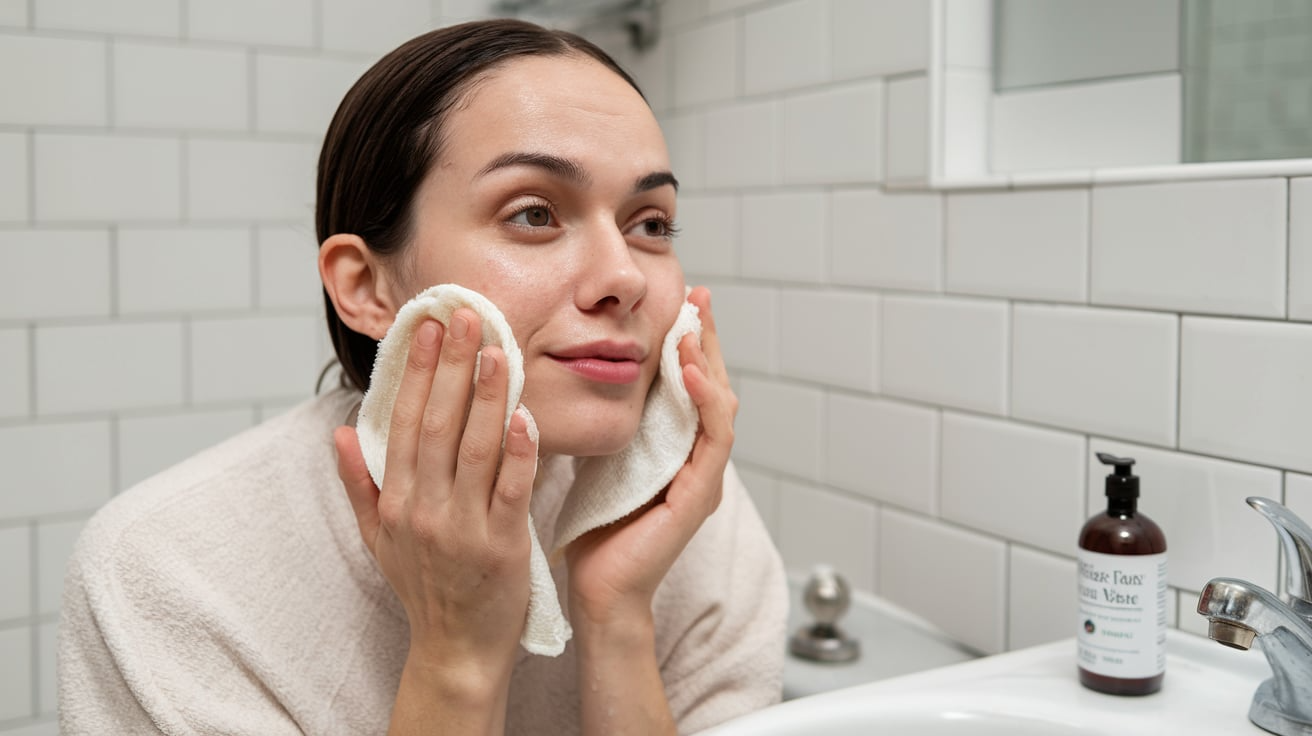Having sensitive skin can be really tough. It often leads to redness, irritation, and even reactions to some skincare products. My skin sometimes feels tight, dry, and even hurts when I use certain ingredients. Finding the best skincare for sensitive skin with effectiveness and gentle is a big challenge.
But, after trying many things, I found a way to keep my skin happy and healthy. It’s all about using calming, soothing, and hydrating skincare products.
What Is Sensitive Skin?
Sensitive skin isn’t just a buzzword in beauty. It’s a real, skin type that reacts more strongly to stimuli than others. Triggers like harsh chemicals, weather changes, or even stress can cause flare-ups that leave your skin feeling raw and uncomfortable. Recent studies estimate that 60-70% of women and about 50-60% of men globally report having sensitive skin, indicating it’s a common concern.
For me, even a slight change in humidity or using a product with alcohol could make my skin break out in tiny, itchy bumps. If you can relate to this, you’re definitely not the only one.
Common Symptoms of Sensitive Skin:
- Redness and inflammation
- Tingling, itching, or burning sensations
- Dry patches or flaky skin
- Breakouts or rashes
Studies published in the Journal of Clinical and Aesthetic Dermatology emphasize that
“Sensitive skin is often linked to conditions like rosacea, eczema, and allergic contact dermatitis, all of which involve an impaired skin barrier and heightened inflammatory response”.
Therefore, taking a holistic approach to skin care is essential for managing these conditions.
What Causes Sensitive Skin?
Sensitive skin can be triggered by several internal and external factors. It’s essential to understand what’s causing your skin to react in order to tailor your routine effectively.
External Factors:
- Harsh Chemicals: Ingredients like sulfates, alcohol, synthetic fragrances, and preservatives can strip the skin of its natural oils, leading to irritation.
- Environmental Stressors: Pollution, extreme temperatures, and even changes in humidity can worsen sensitivity.
- Sun Exposure: Sensitive skin is often more prone to UV damage, making daily sunscreen an absolute must.
- Skincare Ingredients: Even so-called “natural” ingredients like essential oils or citrus extracts can be too harsh for sensitive skin.
Internal Factors:
- Genetics: If your parents or grandparents have sensitive skin, you’re more likely to inherit this trait.
- Hormonal Changes: Fluctuations due to pregnancy, menopause, or birth control can lead to increased skin sensitivity.
- Diet and Lifestyle: Spicy foods, alcohol, and stress have been linked to flare-ups in people with sensitive skin. Studies suggest that stress, in particular, can elevate cortisol levels, which weakens the skin’s barrier function.

Best Ingredients for Sensitive Skin: What to Look For
When shopping for products, you’ve probably seen plenty labeled as “hypoallergenic,” “gentle,” or “fragrance-free.” But what does that really mean? From my experience, it’s not just about finding the “gentle” label—it’s about understanding which ingredients are your skin’s best friend and which are its enemy.
Hero Ingredients for Sensitive Skin:
- Ceramides: Help protect the skin and lock in moisture.
- Niacinamide: Soothes the skin, smooths out your complexion, and makes the skin barrier stronger.
- Panthenol (Vitamin B5): Soothes and hydrates the skin while also helping to improve the skin’s elasticity.
- Oat Extract: Rich in antioxidants and proven to reduce redness and irritation.
- Hyaluronic Acid: A powerful hydrator that is lightweight and non-irritating.
- Centella Asiatica (Cica): Known for its anti-inflammatory and healing properties, it’s fantastic for calming sensitive skin.
Ingredients to Avoid:
- Fragrance: Both synthetic and natural fragrances can cause irritation.
- Essential Oils: Although natural, many essential oils can be too potent for sensitive skin.
- Alcohol (Denatured or SD Alcohol): Can dry out and irritate the skin.
- Harsh Exfoliants: Physical exfoliants like scrubs can create micro-tears in the skin, exacerbating irritation.
Best Skin Care Routine for Sensitive Skin
Creating a personalized skincare routine for sensitive skin has been a journey for me, filled with trial and error. Over the years, I’ve learned that using products that focus on hydration and strengthening the skin barrier has made a world of difference. My sensitive skin reacts to everything, so I’ve found that the gentler the product, the better my skin feels. I want to share my experience and a simple routine that has worked wonders for me.
Cleanser: Keep It Gentle
It’s been hard for me to find a cleanser that doesn’t make my skin feel dry and tight. After trying countless options, I settled on non-foaming, hydrating cleansers. My key was avoiding anything with sulfates or fragrances, as those would immediately irritate my skin. I started using micellar water a few years ago, and it’s been a game-changer—no redness, no irritation, just clean, fresh skin. I can’t recommend this enough if you’ve got sensitive skin like mine.
Product Recommendation: Vanicream Gentle Facial Cleanser
This cleanser is widely recommended by dermatologists because it’s free of harsh chemicals, including dyes, parabens, and fragrances. It’s specifically designed for sensitive skin and has a creamy, hydrating formula that won’t dry out the skin.
Toner: Focus on Hydration
Toners were tricky for me at first because many of them felt too harsh. But then I found alcohol-free toners with ingredients like chamomile and rose water. These felt soothing on my skin and helped restore the balance after cleansing. More recently, I’ve been using toners with prebiotics, which help to calm my skin even more, especially during flare-ups. It’s like giving my skin a little extra love when it needs it most.
Product Recommendation: Klairs Supple Preparation Unscented Toner
This toner is a favorite for sensitive skin because it’s fragrance-free and calming ingredients like licorice root extract and centella asiatica. It helps me to hydrate and calm my skin without any irritation.
Serum: Targeted Ingredients
For a long time, I stayed away from serums because I worried, they might be too harsh for my sensitive skin. But I’ve come to realize that not all serums are the same. Some are made with gentle, hydrating ingredients that my skin absolutely loves. I now swear by niacinamide to reduce redness and hyaluronic acid to keep my skin hydrated. I’ve also started using bakuchiol, a natural alternative to retinol. It’s been amazing—I get all the anti-aging benefits without the irritation that retinol used to cause me.
Product Recommendation: La Roche-Posay Hyalu B5 Serum
This serum contains hyaluronic acid and vitamin B5, known for their soothing and hydrating properties. It’s great because it gives me similar anti-aging benefits without irritating my skin.
Moisturizer: Strengthen the Barrier
Moisturizing has always been the key step in my routine. My skin tends to feel dry and tight, especially in the winter, so I’ve gravitated toward rich, barrier-repairing moisturizers. Those with ceramides and squalane have been the most effective for keeping my skin soft and protected. I also discovered that moisturizers with colloidal oatmeal work wonders for soothing irritation. When my skin is feeling particularly inflamed, that oatmeal ingredient is like magic—it calms everything down.
Product Recommendation: CeraVe Moisturizing Cream
CeraVe is a staple in sensitive skin care, thanks to its formula rich in ceramides and hyaluronic acid. I rely on products that are non-comedogenic (won’t clog pores), fragrance-free, and deeply hydrating without feeling heavy or greasy. This way, my skin stays soft and nourished all day long.
Sunscreen: Daily Sun Protection
Sun protection is non-negotiable for me. Since my skin is super sensitive to the sun, broad-spectrum mineral sunscreen is a must for me every single day. I used to have trouble with chemical sunscreens—they would sting and cause redness—but once I switched to zinc oxide or titanium dioxide, my skin stopped reacting badly.
Lately, I’ve been using tinted mineral sunscreen, which also helps protect against visible light, and I’ve noticed a big improvement in how my skin looks, especially when it comes to redness and dark spots.
Product Recommendation: EltaMD UV Clear Broad-Spectrum SPF 46
This mineral-based sunscreen is a favorite for sensitive and acne-prone skin. The one I use has zinc oxide and niacinamide, which not only protect my skin from UV rays but also calm any redness and irritation.
This simple routine has completely changed the way my skin looks and feels. It’s all about using gentle, effective products and being consistent. If you have sensitive skin like mine, I highly recommend trying these steps—it might take a little time to figure out what works best, but trust me, once you do, your skin will feel so much better.

Innovative Approaches for Sensitive Skin
As new research emerges, sensitive skin treatments are evolving beyond just moisturizers and sunscreens. Here are some of the most innovative approaches available for you:
Probiotic Skincare
The idea that a healthy balance of good bacteria can protect the skin is gaining traction. Probiotic skincare products aim to restore the skin’s natural microbiome, helping to soothe inflammation and enhance the skin’s defense mechanisms.
Product Recommendation: Tula Skincare So Polished Exfoliating Sugar Scrub
This probiotic-infused scrub is ultra-gentle on sensitive skin. It helps remove dead skin cells while supporting a healthy microbiome.
LED Light Therapy
Non-invasive LED light therapy is an emerging treatment for sensitive skin. Blue light can reduce inflammation and target acne, while red light therapy promotes healing and reduces redness.
Product Recommendation: Dr. Dennis Gross Skincare DRx SpectraLite FaceWare Pro
This at-home LED mask uses red and blue light to reduce inflammation, promote healing, and calm sensitive skin.
Summary
The journey to finding the best skin care for sensitive skin requires patience, knowledge, and a bit of trial and error. With the right ingredients—ceramides, niacinamide, hyaluronic acid—and products tailored for sensitive skin, you can build a routine that protects, soothes, and strengthens your skin’s barrier. When you have sensitive skin, you learn that less is more. Keeping things simple can be the secret to achieving healthy, glowing skin.
Frequently Asked Questions
Q: How do I know if I have sensitive skin?
A: If your skin is quick to react to new products, changes in the weather, or even environmental stress, and you often notice redness, irritation, or breakouts, you’re likely dealing with sensitive skin.
Q: Can I use exfoliants if I have sensitive skin?
A: Definitely, but it’s important for you to choose gentle exfoliants. Opt for chemical exfoliants like lactic acid over physical scrubs, and only exfoliate once or twice a week.
Q: What is the best makeup for sensitive skin?
A: For makeup, I always look for options that are non-comedogenic, hypoallergenic, and fragrance-free. Mineral-based foundations and powders are usually safer because they’re less likely to cause irritation.
Q: Are natural products always better for sensitive skin?
A: Not necessarily. While many natural ingredients are great for skincare, be cautious with some, like essential oils, as they can be too strong for sensitive skin. Always check the ingredients list and do a patch test before trying something new.
Q: What causes sensitive skin to flare up?
A: Common triggers include environmental factors (like wind or extreme temperatures), harsh skin care ingredients, stress, and certain foods. This simple, gentle approach has made a world of difference for my skin, and I’m sure it can help yours too!

